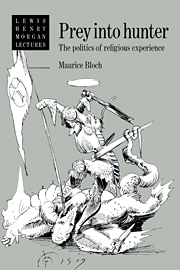2 - Initiation
Published online by Cambridge University Press: 15 December 2009
Summary
One of the better-known groups of people in modern anthropology are the Orokaiva of Papua New Guinea. This is partly because they have been so well described by a number of anthropologists, especially F. E. Williams, and partly because the ethnography has been subtly reanalysed by, among others, Schwimmer, and above all by Iteanu, who has recently published a brilliant, careful and convincing reanalysis of the available material. In this chapter I use Iteanu's work to flesh out the very abstract outline of rebounding violence which was given in the previous chapter. In particular I follow Iteanu's analysis of Orokaiva initiation, which acts out the transformation which gives this book its title: the transformation of initiates from prey into hunters. However, in the end, this chapter reaches very different theoretical conclusions from those of Iteanu and a brief discussion of these differences will serve to define and advance the argument.
Like so many peoples around the world the Orokavia practise the kind of rituals which have been called ‘initiations’ in anthropological literature. This is because passing through these rituals is considered an essential step to beginning or continuing life as a full moral person. The initiation ritual of the Orokavia is reminiscent of that of many other peoples and is typical of the part of New Guinea in which they live. This local character is nowhere clearer than in the fact that the ritual seems to be concerned as much with pigs, birds and spirits as it is with the human beings it initiates.
- Type
- Chapter
- Information
- Prey into HunterThe Politics of Religious Experience, pp. 8 - 23Publisher: Cambridge University PressPrint publication year: 1991

